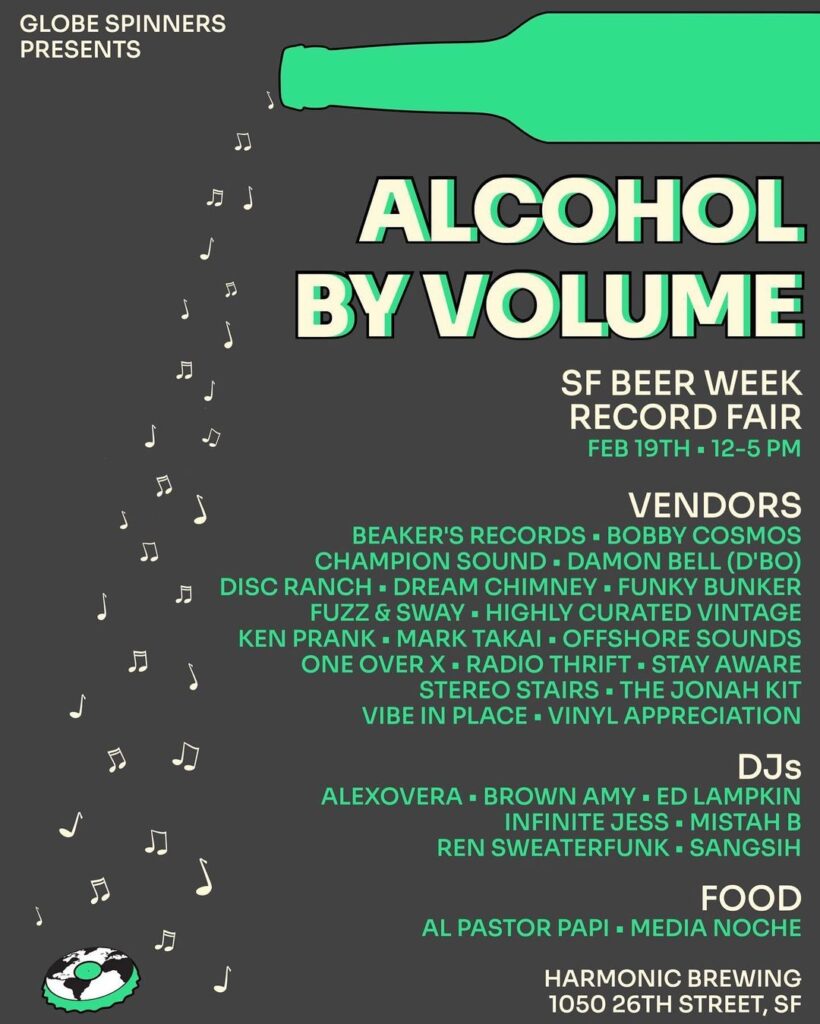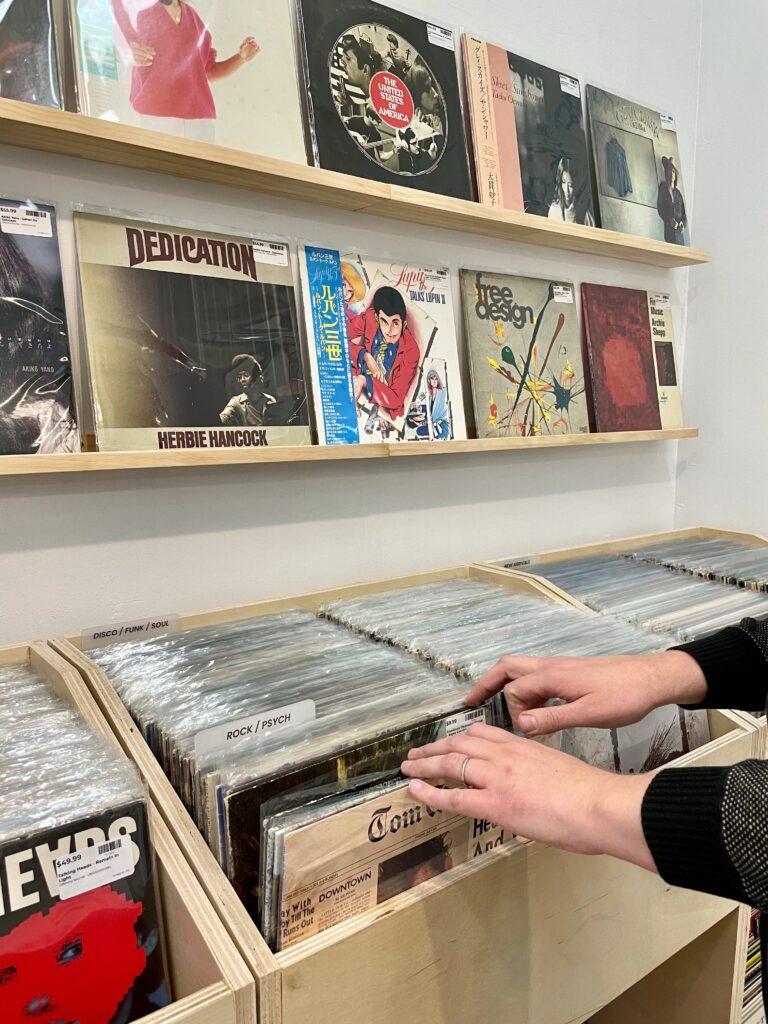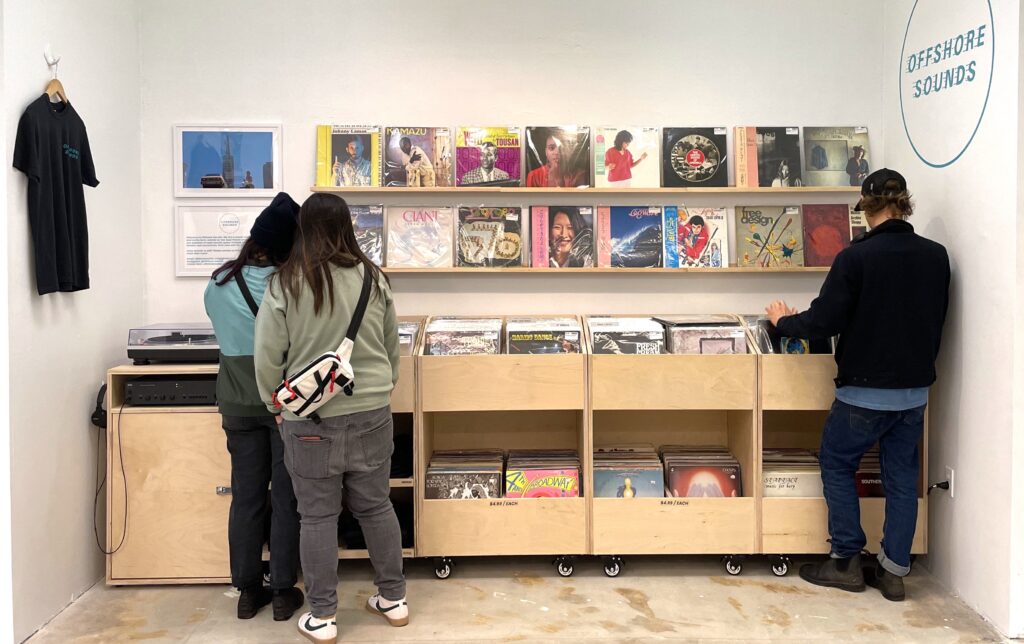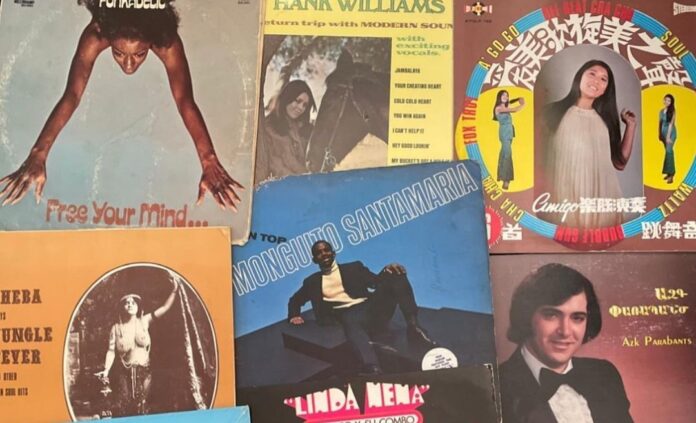When one crate-digging record lover and concert promoter who was laid off during the pandemic met another record lover fascinated by archival practices and international social movements, it was magic—or at least a boost for Japanese City Pop fandom in the Bay Area, for which both qualified. Peter Arko and Dylan Davis not only shared a love of global vinyl rarities but a yen for dealing records, mostly out of necessity in this astronomically expensive corner of the world.
The two launched quarterly record fair and swap Globe Spinners together—the next one is Sun/19 at Harmonic Brewing in SF, polishing off SF Beer Week with tons of vendors and DJs, food, and, of course, drink—to focus on international genres and get together with like-minded friends. Now, they’ve opened a record store, Offshore Sounds, in new space 710 Collective. Offshore Sounds is the latest addition to a music scene that’s recovering from the past three difficult years and embracing physical media more and more. It’s certainly something to get jazzed about.

I emailed Peter and Dylan a few questions before this weekend’s fair, and got a few ear-opening responses about their background, how they came to start the fair, and the process behind opening a brick-and-mortar spot. Be sure to stop by the store and/or fair to support their mission.
48 HILLS You’re both deeply rooted in the music scene here, besides being longtime vinyl enthusiasts. Tell me a little bit about your background and how you came to be selling records.
PETER ARKO I’m a Bay Area native. Since an early age I’ve been interested in discovering music, sharing it with others, and partaking in the community around it. This has remained constant through various chapters in my life. Out of college I started a music blog and promoted concerts under the name Ears of the Beholder from 2008-2015, which focused on emerging indie artists. Booking bands at places like Rickshaw Stop, Bottom of the Hill, and a series of SXSW events eventually led to a job overseeing the NightLife series at Cal Academy from 2011-2018, which included developing a summer concert series and booking weekly DJs.
My last few years of working in events left me contemplating a career change and a path back to working more directly with music in some form. I was laid off from my last full time event job at a local non-profit a few months into the pandemic, and watching the event industry shut down as a result forced me to explore a new direction. During these same years I felt a renewed interest in record collecting (something I started doing out of high school). I started to see how dealing records could be a new way to continue my interest in sharing music with people.
Prior to the pandemic, I had a growing interest in Japanese City Pop, and with sudden time on my hands, I started to import lots of records from Japan—selling some at first on Discogs, as a way to cancel out my shipping costs. With a growing inventory, I started an online store with an expanded catalog of genres from Japan and Southeast Asia and also began selling at various record events.
DYLAN DAVIS I’m originally from Central Illinois, but have been living in the Bay Area since 2011. I’ve had a lifelong relationship with music and luckily grew up in a family that appreciated it and supported my burgeoning musical interests growing up. Playing in bands throughout high school and college coincided with selling my CD collection and getting into records.
But it was really moving to San Francisco and becoming interested in jazz and avant-garde music generally, along with being able to see live performances regularly, that enabled me to start focusing on records more seriously. Living down the street from a place like Groove Merchant was very instructive, but at that time I couldn’t afford to buy many of the records that excited me most. In fact, it was only upon going to graduate school at UC Santa Cruz—having less income at my disposal than ever before—that I started selling the records I had so I could pay for the ones I was most interested in acquiring. Record prices have only gone up since then, as have rents, so over time this practice turned into a way to meet the rising cost of living, and listening.
My own academic project, working on the print networks and media cultures of particular mid-20th century groups of dissident workers and intellectuals on the Far Left, led to a sort of archival outlook on records. I’m particularly interested in documenting neglected or overlooked records, while trying to understand the dialogue that is constantly taking place across different cultural contexts through music.

48H I love that this edition of the Globe Spinners record fair is during Beer Week. What can we expect from the fair, and how did it come into being?
PETER Globe Spinners happens four times a year, twice at Harmonic Brewing in SF in February and August. Recently we partnered with Almanac Brewing in Alameda to offer two East Bay editions, in May and December. We have grown to accommodate 20 record vendors and each event offers a diverse lineup of local DJs. One DJ might be playing Canto-pop, the next cumbia, followed by balearic, rare groove, or Turkish psych.
The spectrum of records available for sale spans the globe, but we also encourage sellers to bring something for everyone. It’s important our event feels inclusive and contributes somehow to the local community of record collectors and music lovers. We’ve also had sellers from Los Angeles join in for past editions. February 19 will mark our seventh Globe Spinners, and our second year aligned with SF Beer Week, where Harmonic will be offering special brews. Beer and music are old acquaintances, so it feels right to continue combining them.
48H Offshore Sounds grew out of a pandemic hustle to help support your families, something I think we can all relate to. What was the journey to get to a brick-and-mortar space inside 710 Collective?
PETER We wouldn’t have a record shop without the Globe Spinners fair. Dylan and I met at a record swap and discovered we have similar tastes, especially in Japanese music. We wanted to organize an event that would draw together local record collectors and DJs with complementary interests, and one that would have something for everyone in terms of record selections–those just starting collecting as well as more seasoned diggers.
With the help of our Sacramento friends Adam Camero and Ed Lampkin, we launched the first Globe Spinners record fair in August 2021 at Harmonic Brewing in the Dogpatch. After six months or so, Dylan and I (both in similar stations in life with new children to care for) decided to start teaming up, acquiring records and selling together at events. With this came discussions of where the partnership could lead, including starting a brick and mortar. We were weary of taking on huge loans and complicating things too much by opening an independent storefront, so we decided it might be nice to find a smaller location for our new store in an existing space.
Luckily, we stumbled across 710 Collective, which is a fairly new operation comprising a number of independent vendors in the Upper Haight. They were excited by the prospect of having a record store involved and we jumped on the chance to come onboard, scrambling a bit to pull everything together in time for our soft opening in December. We began then in a temporary space with around 1000 records, and in January we moved into a larger one where we completed our build-out, now featuring over 1500 records.
We’re excited to be a hybrid physical and online webstore, which allows us to reach people both locally and worldwide. We are really excited about what we can continue to do with our current concept and what it might lead to in the future.

48 HILLS Offshore Sounds’ global spin is making me itch to get my mitts on some of your vinyl. What do you focus on when acquiring records for the store?
DYLAN We try to emphasize records from overseas, international contexts, and regions not typically grouped alongside one another. For the past few years both Peter and I have been buying many records from Japan, and the shop has a strong presence of important Japanese artists. On a given day we’ll have everything from Masahiko Togashi to Mariya Takeuchi, as well as many releases recorded elsewhere but pressed in Japan. It has been interesting to observe the growing popularity of Japanese artists in the US, which has also encouraged us to increasingly seek out lesser known titles from the country.
In exploring certain genres and musical traditions we’re drawn to the ways in which they have been translated and developed in different, sometimes unexpected, countries, regions, and cities. Kwaito and jazz from South Africa, Brazilian tropicália, funk, and disco, and Spanish and Italian ambient music, for instance, are some styles we’re presently gearing up for having more of in the shop. We make a point of featuring records we love and want to share with others, but also we’re always trying to search for records that are new to us, either because we’re simply unfamiliar with them, or have never had copies to listen to—online sound clips being scarce in the world of obscure records.
This is probably the most exciting aspect of a project like this: you are constantly learning as much as relaying music for others to discover and enjoy. But it’s not our only focus. We make an effort to cast a wide net and include lots of classic artists and staple titles so that there’s always a mix of everything, though we currently don’t offer much newer music or reissues.
48H There’s a bunch of new record and record-featuring stores popping up (Dark Entries, Cafe Suspiro, Originals Vinyl). Why do you think the return to physical media is hanging in there right now?
DYLAN I think the physical dimension of digging for something new is particularly appealing for many young people becoming interested in vinyl records today. We tend to be inundated with an overwhelming amount of information online on a daily basis, and gravitating toward an alternative relationship with music is particularly attractive for those inclined to look further.
Records can definitely become overwhelming in their own way—the amount of volume shops have, the space they take up in your apartment, etc—but searching for them often produces a different kind of connection and engagement. This isn’t to say the online component of listening to and searching for music goes away. There are useful tools here, certainly, and I’ve been turned on to quite a lot of different records through Instagram, especially, where it’s not uncommon for friends to post something totally incredible and unknown to me, or who can assist in tracking down a particularly rare record from overseas.
I find that it is these relationships you make with others while searching for new sounds that are most rewarding. While many critics will emphasize the significance of physicality to the renewed mass interest in vinyl records, in the pursuit of “collecting,” in contrast to ephemeral digital streaming platforms or mp3s, my interest has more to do with the learning process behind encountering different kinds of music, which largely happens through digging with others, and I suspect is true for a lot of us.
GLOBE SPINNERS “ALCOHOL BY VOLUME” SF BEER WEEK RECORD FAIR Sat/19, noon-5pm, Harmonic Brewing, SF. More info here.






